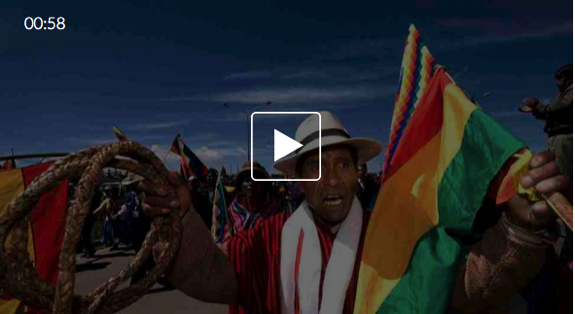
To see video, CLICK ON PICTURE to go to original article -- video is at top of file.
Bolivia's Former President and Defense Minister Face Florida Trial for Civilian Deaths
March 5, 2018 - Miami New Times
Tim Elfrink
In 2003, Bolivian President Gonzalo Sánchez de Lozada and Defense Minister Carlos Sánchez Berzaín fled to Miami amid roiling protests in La Paz. The two had enraged indigenous Bolivians by trying to sell off the country's natural gas reserves to private corporations and then had responded to peaceful protests by ordering out the army, which killed 58 civilians and wounded more than 400 people.
The two figured they would find safe haven in South Florida, as so many other deposed strongmen have done. But they didn't count on the extraordinary resolve of Eloy and Etelvina Mamani, whose 8-year-old daughter, Marlene, bled to death in their home near Lake Titicaca after a government sniper shot her through the chest.
Along with several other victims of the massacre, the Mamanis sued the two Bolivian leaders in federal court with the help of the International Human Rights Clinic at Harvard. Today, after more than a decade of legal battles, the Mamanis will get to face Sánchez de Lozada and Berzaín in court.
Lawyers for the families say the trial, set to begin in Fort Lauderdale's federal courthouse, will be the first time a former head of state faces a human rights trial in U.S. civil court.
"The former president and his minister of defense must now listen as we testify about what happened," Teófilo Baltazar Cerro, a member of the indigenous Aymara community of Bolivia, said in a news release. "We look forward to this historic opportunity to have our day in court."
The roots of the case date back to the early 2000s, when Sánchez de Lozada — a U.S.-educated, corporation-friendly leader — took power and tried to begin privatizing state resources, with the hearty backing of the Clinton administration. (James Carville even ran his successful 2002 campaign in Bolivia.)
As New Times wrote in a 2008 feature about the case, that move quickly ran into strong opposition from the impoverished Aymaras and Quechuas in the western highlands:
By 2003, a long-simmering feud over what to do with Bolivia's natural gas deposits had reached a boil. Goni wanted to bring in foreign companies to pipe the gas through neighboring Chile, to the sea, and eventually to California, but indigenous protesters — who despised foreign companies and Chile with equal aplomb — vowed to stop him. In early 2003, a young, charismatic Aymara coca farmer named Evo Morales (who had come in second to Goni in the election a year before) began gathering indigenous groups to block the plans, pushing instead for nationalization. With little political clout, Morales turned to civil disobedience: Protesters destroyed roads and barricaded towns in the highlands around La Paz, seeking to choke the economy until their demands were met.
Sánchez de Lozada ordered Berzaín and the military to respond — and they did, with violent force. As protests intensified amid the dozens of deaths and hundreds of injuries, Sánchez de Lozada and his defense minister resigned October 17, 2003, and jetted to Miami. They lived here in comfort in Key Biscayne, but the Mamani family wanted justice for their daughter.
"I want them all in jail," Etelvina told New Times in 2010. "But that doesn't seem possible."
SHOW ME HOW
With the help of Harvard's lawyers, they found one angle for justice in Miami's federal courts. Lawyers for the former leaders have spent years arguing that U.S. courts have no jurisdiction over what happened in Bolivia in 2003.
"All evidence shows the response of the Sánchez de Lozada government was constitutional, lawful, and appropriate," Howard Gutman, an attorney for the Bolivian leaders, said in 2008.
But the Mamanis have won several major victories already. In 2016, a judge ruled they could continue fighting for their case under the U.S. Torture Victim Protection Act, and last month a motion for summary judgment by the former leaders was tossed out, clearing the way for today's trial.
"The trial will offer indigenous Aymara people, who have historically been excluded from justice, a chance to testify about events that led to dozens of deaths and hundreds of injuries," Beth Stephens, an attorney for for the victims, says in a statement.